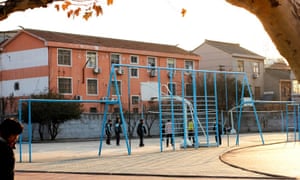Illnesses ranging from nosebleeds to leukaemia among pupils at Changzhou Foreign Languages School, with highly toxic illegal waste dumping blamed

Environmental activists in China are calling for new laws and an independent investigation into how hundreds of Chinese students fell ill – in some cases severely – after attending a school built on a toxic waste dump.
In a case that is being compared to one of the worst environmental catastrophes in US history, about 500 students at a school in the eastern province of Jiangsu have reportedly been affected since late 2015 by ailments including nosebleeds, headaches, coughs, rashes and, in the worst instances, lymphoma and leukaemia.
According to reports in the Chinese media, tests on the soil and air around the Changzhou Foreign Languages School have detected hazardous levels of toxins, including chlorobenzene, a highly toxic solvent that causes damage to the liver, kidney and nervous system.
The scandal hit China’s front pages and sparked a major public outcry this week after tens of millions of television viewers tuned into a report about the students’ plight on state broadcaster CCTV.
“My leg cramps and I get pimples,” one 12-year-old girl told the channel’s reporters. “My hands start to peel.”
CCTV claimed that of 641 students seen by doctors, 493 were suffering from a range of illnesses. Ma Jun, a leading Chinese environmentalist, said the tragedy bore a shocking resemblance to the notorious Love Canal disaster of 1978 in the US.
In August that year, President Jimmy Carter declared a state of emergency after toxic chemicals – dumped during the 1940s and 50s – were found oozing into a residential community in upstate New York. The chemicals were blamed for health problems ranging from skin rashes to birth defects, miscarriages and an increased incidence of cancer. Hundreds of residents were evacuated to escape the contamination.
Speaking on Tuesday, Ma, the director of the Beijing-based Institute of Public and Environmental Affairs, called for a “comprehensive and independent” investigation into how a similar disaster had been allowed to happen in China.
“It is very sad. It’s tragic. It’s hard to imagine the feelings, especially for the parents, whose children have been exposed to such toxic sites,” he told the Guardian.
According to reports in China’s domestic media, the Changzhou Foreign Languages School opened a new campus in 2015 near the former premises of three chemical factories: Changyu, Huada and Changlong. Classes reportedly began before the completion of an environmental impact report warning that the area’s groundwater and soil had been contaminated.
A former employee at the Changlong factory – the largest of the three – told CCTV that staff had poured “highly toxic chemicals” into a local river and buried toxic waste nearby. Chlorobenzene was found at nearly 100,000 times the levels that are considered safe.
Facing public outrage, China’s environment ministry this week announced anemergency inspection at the school and vowed it would “work to protect students’ physical and mental health”.
However, on Tuesday, authorities in Changzhou sought to play down the scandal. According to the Beijing News, city authorities claimed that only four of the school’s 2,451 students had asked for sick leave and officials denied any students had been diagnosed with leukaemia.
Activists, experts and the families of those affected have reacted to those claims with suspicion. “We are very scared and don’t know which side we should believe,” the mother of one teenage victim said, according to the South China Morning Post. “It’s horrific.”
Greenpeace said the tragedy underlined “how dangerously lax China’s hazardous chemical management is”. In a statement, the environmental group said authorities had failed to conduct a comprehensive evaluation of the risks involved in building a school on the site of a former chemicals factory.
Concrete proof of a connection between the students’ illnesses and the contamination has yet to be found but experts suspect the two are linked. “The pollution was obvious and as far as I am concerned the pollutants detected are similar to the chemical discharge of those factories,” Pan Xiaochuan, a public health expert from Peking University, told CCTV.
Ma Jun said that in the wake of the Love Canal disaster US lawmakers had introduced powerful legislation that made chemical companies “extremely cautious” about the disposal of hazardous materials. Similarly tough laws were needed in China as the country embarked upon the massive redevelopment of so-called contaminated brownfield sites.
Ma said that when Chinese companies illegally dumped toxic waste they tended to dump the most harmful substances because they were the most expensive to dispose of.
“It’s all about ultra-high profits – illegal profits. So we need to make sure that they understand that [if they illegally dump waste] it will cost them not just a fortune – but it will cost them the whole company if they do that,” he said.
“The lesson from Love Canal and the experience in the west is that we need to have really powerful legislation so that polluters will take no chances.”
[Source:- Gurdian]

